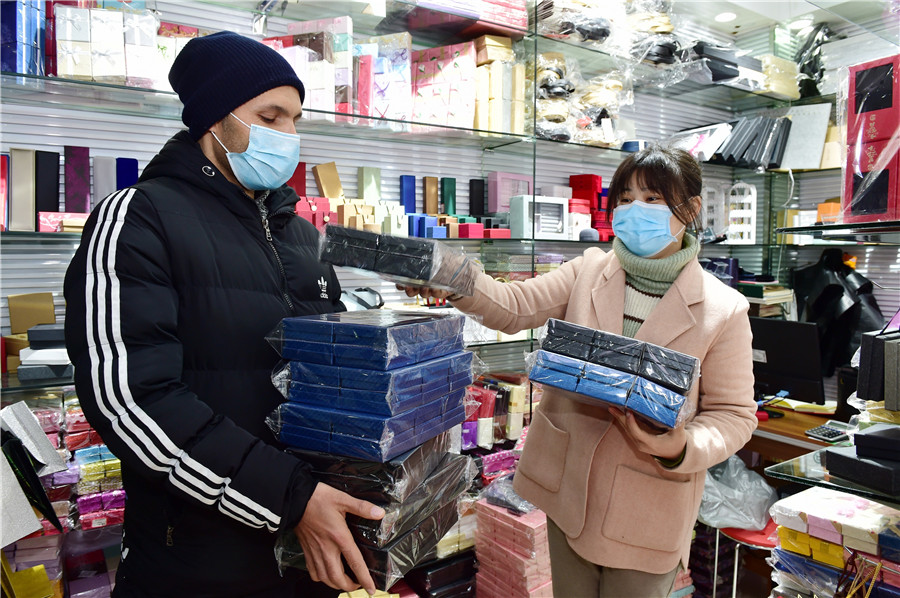'World's Supermarket' sees foreign trade growth in H1 amid global economic downturn


HANGZHOU -- With a lamp, a laptop and a mobile phone in a shared livestreaming room set up in the Yiwu International Trade Market, the world's leading small commodities market, a female anchor tried on various kinds of jewelry and clothes while interacting with potential buyers online.
The anchor had sold out 2,000 items of black knitwear before the webcast was over. Such scenes are now common in the city of Yiwu in East China's Zhejiang province, which is home to over 2 million micro, small and medium-sized firms, and sells commodities to about 200 countries and regions every year.
"Livestreaming sales is 'win-win' cooperation," said Zhu Sufang, who is among the first batch of merchants in the market to join hands with network anchors.
The partnership brought considerable profits to Zhu's jewelry business, with half of its orders from livestreaming. Despite the impact of COVID-19, her business witnessed a 20-percent growth year on year in the first half of this year (H1).
Zhu is not alone. Facing the epidemic, companies and the government in Yiwu, known as the "World's Supermarket," are striving to find new business paths and opportunities in the crisis.
According to data from Yiwu customs, its total import and export value increased to 136.25 billion yuan (about $19.58 billion) in H1, up 1.6 percent over the same period last year, despite uncertainties and instabilities in the global economy.
NEW SALES CHANNELS
"Not long ago, our merchants who were used to offline wholesale business refused to cooperate with anchors," said Tao Xiaoyan, an administrator with the China Commodities City in Yiwu.
Tao said the epidemic prompted the offline sellers to change their minds, and now more than half of them have benefitted from livestreaming sales.
The small commodities market in Yiwu showed great innovation and vitality during the epidemic, with more than 2.1 million kinds of products including ornaments, general merchandise and medical supplies delivered to consumers through new channels such as group buying, e-commerce and livestreaming sales.
"I saw a video of an outdoor product from Yiwu that has been viewed by tens of millions on TikTok," said Wang Mingqiang, general manager of AliExpress. "For overseas buyers, videos have an advantage in commodity display."
Wang also said with the increasing demand for contactless service in the global market during the pandemic, cross-border e-commerce has entered a stage of rapid development.
In response to the COVID-19 resurgence overseas, local sellers in Yiwu have sped up their efforts to expand their businesses globally by collaborating with cross-border e-commerce platforms such as Alibaba.com and Amazon. Currently, the number of Alibaba.com members from Yiwu has climbed to 6,600, an increase of more than 60 percent since the beginning of the year.
On June 18, the Yiwu-based Zhejiang China Commodity City Group Co Ltd and Alibaba Group established a joint venture of the Electronic World Trade Platform (eWTP) to help more small and medium-sized companies go global digitally.
The local government also plays a vital role in helping enterprises make full use of markets and resources both at home and abroad.
The Department of Commerce of Zhejiang Province signed a cooperation memorandum with Amazon Global Selling on July 1. The two sides will jointly promote the transformation and upgrading of traditional foreign trade enterprises in 10 cities of Zhejiang, and help them develop export, cross-border and e-commerce businesses through Amazon's overseas sites.
NEW GROWTH POINTS
"The small commodity market in Yiwu is an important chain in the global daily consumer goods trade. Its prosperity is of great significance for stabilizing foreign trade and boosting domestic demand," said Wang Dong, general manager of the Zhejiang China Commodities City Group Co Ltd.
The local government and import and export enterprises in Yiwu have taken a slew of measures to stabilize the supply chains amid uncertainties.
After the outbreak of COVID-19, the overseas orders of Zhejiang Meizhiyuan Cosmetics Co Ltd, a Yiwu-based company that used to export perfumes, dropped sharply due to the drastically reduced demand of social activities worldwide, according to Chen Zhenzhen, the company's foreign trade manager.
However, the company began to turn to disinfectant production in early February as part of efforts to meet the market demand amid the pandemic.
"Our company's exports of disinfectants, which covered the loss of perfumes, rose slightly in the second quarter of this year," Chen said.
More and more firms in fields like cosmetics and textiles in Yiwu have created new growth points for their development to adapt to the "new normal" of living with the virus. The export of products related to the stay-at-home economy, including baking tools and fitness equipment, has achieved rapid growth. In August, the city will also hold an international fair for anti-epidemic materials.
Since the market resumed operation, Yiwu has also dispatched 20 working teams to 27 provinces and cities to attract domestic buyers, and contacted more than 10,000 overseas buyers through foreign trade enterprises, associations and other channels.
Statistics show that a total of 350 China-Europe freight trains departed from Yiwu in H1 after further optimizing the operation mechanism, with the cargo volume increasing by 157.1 percent year on year, ensuring the stability of the Asia-Europe supply chain.



































